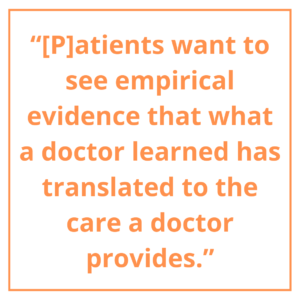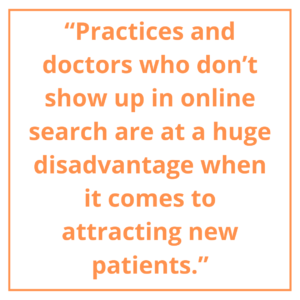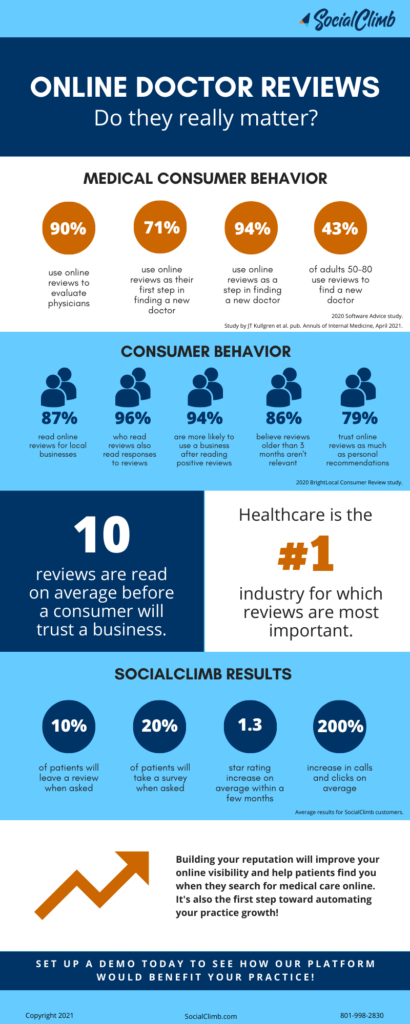Online doctor reviews impact online visibility, and that directly influences how you show up in online search results.
Yes, online doctor reviews do matter. 
Strange as it may seem, most patients don’t place as much weight on where a doctor went to school or the grades he or she achieved. Patients don’t tend to ask to see a doctor’s credentials or academic proof of expertise—though those discussions do come up from time to time.
Instead, patients want to see empirical evidence that what a doctor learned has translated to the care a doctor provides. They want to see how that care has played out with other patients. That used to mean talking to friends and neighbors, but in today’s digital age, it means going online to read through reviews.
The SocialClimb platform helps doctors and medical practices automate their practice growth, and the first step in that process is improving the online reputation of individual doctors and the practice as a whole. This important step provides the basis for that growth.
So yes, online doctor reviews do matter, and I’ll give you some data to back that up along with an infographic at the bottom that shows all that data in one place.
Consumer behavior patterns show the importance of online reviews.
 BrightLocal measured consumer behavior when it comes to online reviews in 2020 and published the results in their Local Consumer Review Survey. They found that both leaving reviews and reading reviews play an important role in how consumers make decisions on where to shop and who to trust.
BrightLocal measured consumer behavior when it comes to online reviews in 2020 and published the results in their Local Consumer Review Survey. They found that both leaving reviews and reading reviews play an important role in how consumers make decisions on where to shop and who to trust.
- These days, 87% of consumers report reading online reviews of local businesses. A large majority of consumers will take time to read online reviews when making decisions about local businesses, up from 81% in 2019. This increasing majority highlights the importance of reviews to consumers who are choosing where to take their business.
- Among consumers who read online reviews, 96% also read responses to reviews. No significant difference exists when it comes to the importance of responding to negative or positive reviews—it seems consumers just want to see a response. The survey found that 69% of consumers would be more likely to use a business that responded to positive reviews, while 70% would be more likely to use a business that responded to negative reviews. Responding to negative reviews can be a bit tricky, especially for healthcare professionals. Read more about how to respond to negative reviews.
- After reading positive reviews, 94% of consumers are more likely to use a business. Consumers are looking for a business—or a medical practice—that has a high rating and a good number of positive reviews. Unfortunately, if you’re not actively asking for reviews, those who have had a negative experience are more likely to leave feedback than those who were happy with the care they received. And that drives your rating down.
- Approximately 86% of consumers believe that reviews older than 3 months aren’t relevant. Recency matters. Old reviews can give a consumer an idea of the situation, but clearly, newer reviews carry more weight. In fact, 73% want to see reviews a month old or less, and 50% believe reviews must have been left within the past two weeks to be relevant.
- Surprisingly, 79% of consumers trust online reviews as much as personal recommendations. Patients looking for a new doctor want to find one they can trust. In the past that may have meant they asked neighbors and friends for a recommendation. Now it’s easier to simply go online with an inherent trust tied to the anonymity of crowdsourced, online reviews, where there is little motive to pad a review.
- Consumers typically read 10 reviews on average before they will trust a business. It’s a good idea to make sure you have a minimum of 10 reviews on each site where consumers will read your reviews. This seems to be the magic number—or at least the average number—that helps consumers verify that the reviews are a good indication of how trustworthy a business is.
- The #1 industry for which reviews are most important is the healthcare industry. Those in search of medical care put more weight on the importance of reviews than consumers reading reviews in other industries. Restaurants followed by hotels are the industries in second and third place where reviews are found to be most important.
Medical consumer behavior clearly shows the importance of online doctor reviews.
Software Advice conducted a study in 2020 focused directly on how patients use online reviews. They found a growing trend among patients using review sites as a tool in their search for a new physician. Another study published in the Annals of Internal Medicine set out specifically to look at how older adults use reviews when choosing a new doctor.
- The survey found that 90% of medical consumers use online reviews to evaluate physicians. This is up from 25% way back in 2013 when Software Advice conducted a similar survey. The 9 out of 10 medical consumers who evaluate physicians include those who often use reviews (18%), sometimes use reviews (47%), and rarely use reviews (25%) in their physician evaluations. It’s definitely trending up.
- When finding a new doctor, 71% of medical consumers look to reviews as their FIRST STEP. The internet fills an increasingly important role in the information age; your reviews may be the first thing a new patient sees about you. It is worth your time to make sure your online reputation accurately represents the high level of care you provide to your patients.
- Medical consumers use reviews as a step in their process of finding a doctor 94% of the time. That number is derived by adding 23% of medical consumers who use reviews to validate their choice of a new doctor to the 71% who use reviews as their first step in finding a doctor. That leaves only 6% of medical consumers who don’t use reviews at all when finding a doctor.
- Among adults aged 50 to 80, 42.9% reported using online doctor reviews and ratings when choosing their doctor. The study, Use of Online Physician Ratings and Reviews by Older U.S. Adults: Results of a National Survey, was published in the Annals of Internal Medicine in April, 2021, and conducted by JT Kullgren et al. That’s pretty significant when you consider that many in that age group are not necessarily comfortable with either smartphones or computers.
Medical practices that use SocialClimb’s platform get results.
Practices and doctors who don’t show up in online search are at a huge disadvantage when it comes to attracting new patients. We’ve been helping medical practices grow by improving their online visibility for years, and we have some stats of our own you may be interested in.
 When asked through our platform, 10% of patients on average will leave a review. Our platform integrates with your practice management systems to automatically send review requests to your patients within 24 hours of care. Patients receive a personalized request they can complete in 30 to 60 seconds, giving them the opportunity of leaving a review quickly and painlessly. It’s a great way to get reviews for doctors.
When asked through our platform, 10% of patients on average will leave a review. Our platform integrates with your practice management systems to automatically send review requests to your patients within 24 hours of care. Patients receive a personalized request they can complete in 30 to 60 seconds, giving them the opportunity of leaving a review quickly and painlessly. It’s a great way to get reviews for doctors.
- When a medical practice asks patients to fill out a survey, about 20% will do so. You can send patient satisfaction and patient reported outcome survey requests through our platform as well, making it simple to digitize the process and collect all your information in a single location.
- The average star rating increase in the first few months for our customers is 1.3 stars. If your practice or a doctor already has a high star rating, the rise will not be as drastic. However, the more reviews you pull in, the more stable your rating will be. It will be more reflective of actual patient sentiment, and when you do get an occasional negative review, it won’t have as big an impact on your overall rating.
- Our customers experience a 200% increase in calls and clicks on average. We track the calls to your office and the clicks to your website that come in from your GMB listing and from your ads sent through our platform. We can also tell you who has made appointments from these calls, so you can see your patient acquisition cost from your marketing efforts and know your ROI.
SocialClimb helps practices and individual physicians improve their online reputation, send out ads that boost their brand and target high-value patients, and measure their ROI in the process. Set up a demo to see how we can help you automate your practice growth by calling 866-338-8270.















